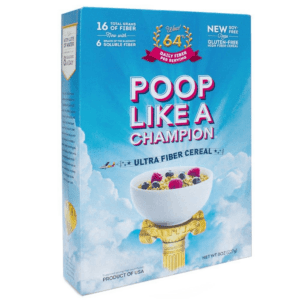
Speaking of standing out from the crowd, below is a real cereal being sold on Amazon Prime called “Poop Like A Champion.” I’m not 100% sure it’s the best name, BUT it certainly does get the “don’t bury the benefit” award in advertising. At least they didn’t put a picture of the end result on the box (LOL). BUT it DOES have something most products don’t: a UNIQUE differentiator, also called a USP.
Although I’ve covered this topic multiple times, I’ve gotten a TON of questions about it from new clients via their NewMember Survey, so a refresher…
We do managed services, backups, cyber security, help desk, documentation, blah blah blah. ZERO differentiation. It’s “WHAT”-based marketing. And when your service looks exactly like everybody else’s, it’s exponentially more difficult to get a customer and near impossible to maintain or grow margins, because there’s always someone willing to undercut you on price – and prospects will always default to price as the means for their decision, given no other logical reason to spend more. Why wouldn’t they? Further, you’re interchangeable with everyone else (or at least appear to be). Problem is, it’s getting harder and harder to obtain TRUE differentiation.
That said, there is a better, more practical path of differentiation and client attraction that provides a far more lasting, harder-to-copy advantage –
What-based marketing is focused on products and services. WHO-BASED starts with WHO you want as a client…WHO has a flexible wallet and the ability to spend more on what you can deliver…WHO makes for a productive, profitable client…WHO has unmet needs and dissatisfaction with the current pool of vendors or options…
WHO you can best serve. Practically NOBODY starts with the WHO, but that’s where all the power and profit is. And before you can even begin to develop a USP, you must get clear on WHO you want to attract first. Everything hinges on that.
An example: A colleague of mine in the dental niche made a small fortune in marketing dentistry for diabetics. The actual dental work itself – cleaning, evaluating, and treating diabetic patients – is not really all THAT different from what any dentist does to non-diabetic patients. Further, all dentists have to be aware of and appropriately treat diabetic patients as they would patients with heart conditions, high blood pressure, etc. However, not all dentists actively promote the fact that they “specialize” in treatment for diabetics. Since people with diabetes is one of the fastest-growing segments in America (which is a WHOLE ’other topic in and of itself), a dental practice that has a marketing focus on diabetics as its sole niche, or at least one area of specialization, is able to secure that market share away from other dentists simply BECAUSE they are marketing and promoting their expertise in that field.
Another colleague of mine in the legal niche charges above-average fees because he specializes in elder law for people with Alzheimer’s disease. Another client specializes in IT support and services for Mac-based law firms. You get the idea. ALL of these are examples of niche specialization based on WHO, and in doing so, they carve out a USP for themselves.
Right now, there are dozens upon dozens of market segments that would BUY cyber security support and IT solutions from YOU if you could show even a tiny area of specialization and expertise. Take a closer look at your client base, your market area, and your own background and expertise. Certainly, ONE niche possibility will pop out. You don’t have to dedicate your ENTIRE business to that niche if it turns out to be too small to sustain you – but certainly, a focus on it would bring you more clients, along with their referrals, while also giving you the ability to command higher fees.

